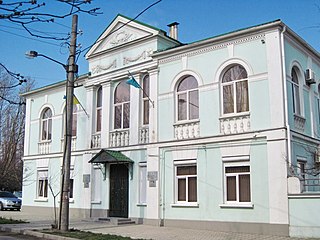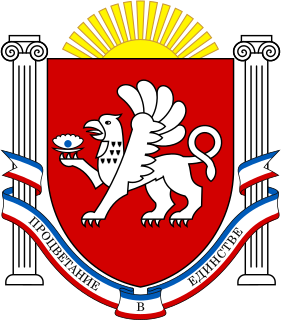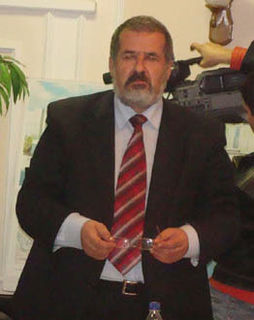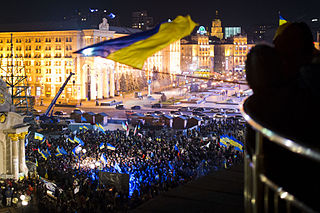
Ukraine is divided into several levels of territorial entities. On the first level there are 27 regions: 24 oblasts, one autonomous republic, and two "cities with special status". Following the 2014 Crimean crisis, Crimea and Sevastopol became de facto administrated by the Russian Federation, which claims them as the Republic of Crimea and the federal city of Sevastopol. The international community recognises them as being Ukrainian territory.

Mustafa Abduldzhemil Dzhemilev, is former Chairman of the Mejlis of the Crimean Tatar People and a member of the Ukrainian Parliament since 1998. He is the recognized leader of the Crimean Tatar National Movement and a former Soviet dissident.

The State Council of Crimea is the parliament of the Republic of Crimea. It had previously been called the 'Supreme Council of Crimea but changed its name in March 2014 following a vote by the Ukrainian parliament to dissolve the Supreme Council of Crimea. The Parliament is housed in the Parliament building in the centre of Simferopol.

The Mejlis of the Crimean Tatar People is the single highest executive-representative body of the Crimean Tatars in period between sessions of the Qurultay of the Crimean Tatar People.
The politics of Crimea today is that of the Republic of Crimea on one hand, and that of the federal city of Sevastopol on the other, within the context of the largely unrecognised annexation of Crimea by the Russian Federation in March 2014.

The President of the Republic of Crimea was the head of the state of the Republic of Crimea, Ukraine from February 16, 1994 to the time of its liquidation on March 17, 1995. The post was liquidated as it disagrees with the Constitution of Ukraine.

The Party "Soyuz" is a national political party of Ukraine that is mostly based in Crimea. It was registered in June 1997 under a registration number 867.

The 2010 Crimean parliamentary election were held on 31 October 2010 as a part of the general 2010 Ukrainian local elections. Unlike the previous election to the Verkhovna Rada of Crimea, they were conducted on the mixed member proportional representation system. In order to gain representation in the Parliament of the Autonomous Republic of Crimea, a party or bloc had to garner at least 3 percent of the total vote. The Party of Regions won the elections with an overwhelming majority.

Verkhovna Rada of Crimea or the Supreme Council of Crimea, officially the Supreme Council of the Autonomous Republic of Crimea was a Ukrainian legislative body of the Autonomous Republic of Crimea before the annexation of Crimea by the Russian Federation in 2014.

Refat Abdurakhmanovich Chubarov is a Ukrainian politician and public figure, leader of the Crimean Tatar national movement in Ukraine and worldwide.

A controversial referendum on the status of Crimea was held on March 16, 2014, by the legislature of the Autonomous Republic of Crimea and by the local government of Sevastopol. The referendum requested local populations whether they wanted to join Russia as a federal subject, or if they wanted to restore the 1992 Crimean constitution and Crimea's status as a part of Ukraine. After the events of Euromaidan, the referendum was held during a Russian military takeover of Crimea. The referendum is not internationally recognized by most countries.

Sergey Valeryevich Aksyonov is the Head and Prime Minister of the Republic of Crimea from 2014. which is an internationally disputed federal subject of Russia located on the Crimean Peninsula.
![Autonomous Republic of Crimea administrative division of Ukraine since 1992, not occupying the whole peninsula [see Q15966495 for Russian subdivision proclaimed in 2014]](https://upload.wikimedia.org/wikipedia/commons/thumb/a/aa/Flag_of_Crimea.svg/320px-Flag_of_Crimea.svg.png)
The Autonomous Republic of Crimea is, de jure, an autonomous republic of Ukraine encompassing most of Crimea, though, de facto, it was annexed by the Russian Federation in 2014.

The 2014 Ukrainian local elections took place on 25 May 2014, four years after the conclusion of the last local elections, which took place in October 2010. The elections occurred during the political crisis in the aftermath of the 2014 Ukrainian revolution.

The Crimean Peninsula was annexed from Ukraine by the Russian Federation in February–March 2014 and since then has been administered as two Russian federal subjects—the Republic of Crimea and the federal city of Sevastopol. The annexation followed a military intervention by Russia in Crimea that took place in the aftermath of the 2014 Ukrainian revolution and was part of wider unrest across southern and eastern Ukraine.

The Republic of Crimea is a federal subject of Russia that is located on the Crimean Peninsula. The capital city and largest city within the republic is Simferopol which is also the second largest city of Crimea, behind the federal city of Sevastopol. At the last census the republic had a population of 1,891,465 .

Natalia Vladimirovna Poklonskaya is a Russian politician, serving as Deputy of the State Duma of Russia from 5 October 2016.

Parliamentary elections took place in the Republic of Crimea on 14 September 2014. These were the first elections since Crimea's annexation into the Russian Federation earlier that year. The outcome was an overwhelming victory for President Vladimir Putin's United Russia party.

A prolonged crisis in Ukraine began on 21 November 2013 when then-president Viktor Yanukovych suspended preparations for the implementation of an association agreement with the European Union. The decision sparked mass protests from the proponents of the agreement. The protests, in turn, precipitated a revolution that led to Yanukovych's ousting. After the ousting, unrest enveloped in the largely Russophone eastern and southern regions of Ukraine, from where Yanukovych had drawn most of his support. Subsequently, an ensuing political crisis developed after Russia invaded said regions and annexed the then-autonomous Ukrainian region of Crimea. As Russia's invasion emboldened the Russophone Ukrainians already in upheaval, the unrest in the Donetsk and Luhansk oblasts devolved into a subnational war against the post-revolutionary Ukrainian government. Then, as that conflict progressed, the Russophone Ukrainian opposition turned into a pro-Russian insurgency often supported and assisted by the Russian military and its special forces.












![Autonomous Republic of Crimea administrative division of Ukraine since 1992, not occupying the whole peninsula [see Q15966495 for Russian subdivision proclaimed in 2014]](https://upload.wikimedia.org/wikipedia/commons/thumb/a/aa/Flag_of_Crimea.svg/320px-Flag_of_Crimea.svg.png)





